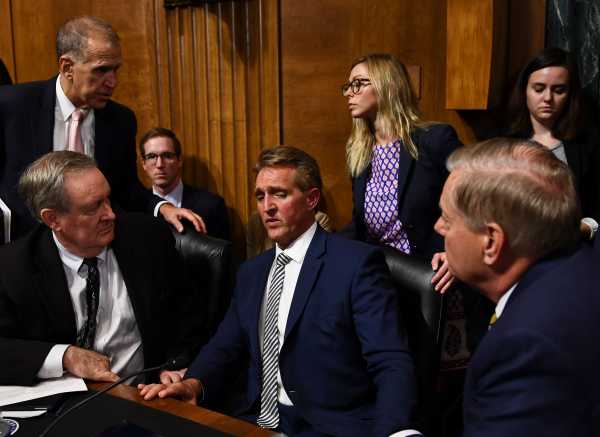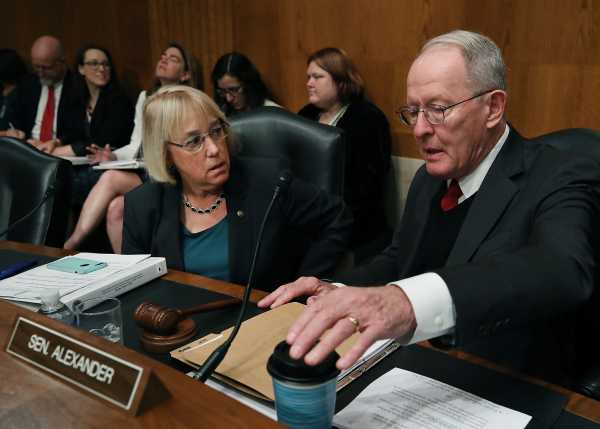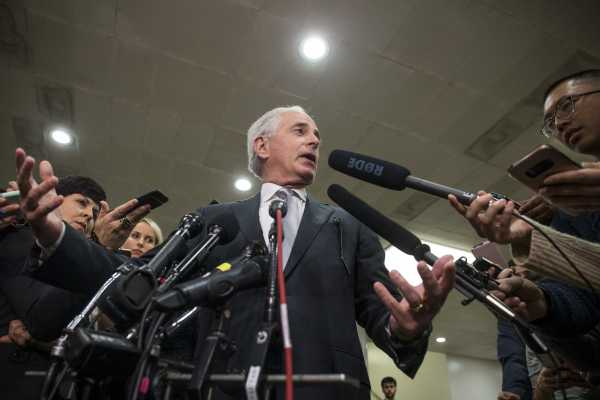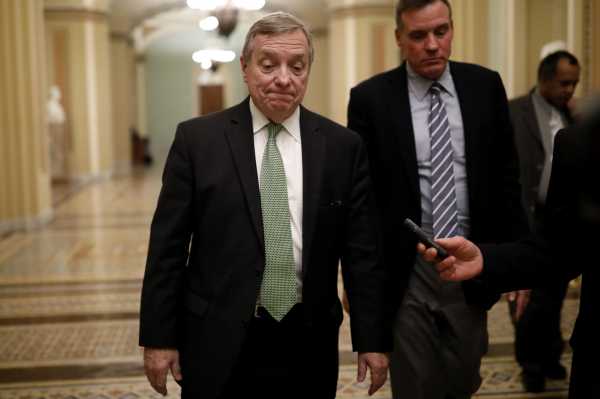
Washington, DC — especially in the age of Donald Trump — has a way of grinding down the best intentions.
It’s no accident Sen. Jeff Flake (R-AZ) is the defining tragic figure of Trump’s first two years in Washington. Flake, a Mormon dad with a self-deprecating sense of humor, was subsumed by the Trump tide. Here was a senator who was — or at least certainly thought himself to be — a guardian of civility and good discourse, calling out what he saw as the corrosion of American politics. And he found himself boxed out of his own party, left to retire and ineffectually hint he might run for president in 2020, a pursuit we can already judge as futile.
Flake, who gave sternly worded speeches on the Senator floor, seemed like he wanted to try. Yet at the decisive moments of the past two years, Flake’s better angels fled him. Even though he held a lot of leverage as a Republican senator when the party had a razor-thin majority, he never quite seemed willing to use it. He was ready to stand on principle and vote down his party’s tax bill because the Republicans were about to blow a hole in the deficit — until he wasn’t and he didn’t. He took the allegations against Supreme Court nominee Brett Kavanaugh more seriously than most of his peers and appeared genuinely conflicted about how to vote — until he voted to put Kavanaugh on the Supreme Court.
It wasn’t just Flake’s good intentions that came to Capitol Hill to die over the past two years.
Other senators did try, at times, to cut through the Trump-driven hysteria and conduct normal business. Just as Democrats and Republicans neared an unprecedented bipartisan deal to shore up Obamacare, partisanship reared its ugly head again. The bipartisan criminal justice bill passed by Congress this month was startling because of how rare such instances are anymore. Then again, the 115th Congress is about to end with the government shut down.
Spend enough time on the Hill and you’ll hear a lot about how the Senate isn’t the same anymore. It is a tired cliché, but there is also some truth to it. There was a time when modest gestures of goodwill and bipartisanship were routine. Nowadays, Congress is defined by stories of goodwill crumbling under pressure.
Here are those stories.
1) Jeff Flake wanted to help undocumented immigrants — and then settled for nothing
Nothing troubles Jeff Flake more than Trump’s hardline immigration agenda. He comes by it honestly: The Arizona senator attributes his soft spot for undocumented immigrants to his childhood growing up on a ranch. He understands the United States’ labor demands and respects the hard work and sacrifice immigrants endure to give their families a better, safer life. He naively didn’t think the Trump administration would try to end the Deferred Action for Childhood Arrivals program. When they did, in September 2017, Flake thought, even more naively, that Republicans and Democrats could band together and pass a version of the DREAM Act, a bill that would have given a path to citizenship to young undocumented immigrants.
But Republican Senate leaders, perhaps more aware of Trump’s extremism on the issue, were reluctant to move on immigration altogether, leaving close to 700,000 undocumented immigrants in legal limbo. By the end of 2017, no one was seriously talking about immigration.
But then, as Senate Republican leaders were scrambling to patch together votes for a tax bill, Flake suddenly had the leverage to push action on immigration, since the party could lose just only one vote (with John McCain living out his last days in Arizona).
But Senate Majority Leader Mitch McConnell and the White House leaned hard on Flake. He’s a Republican; he’s supposed to cut taxes.
In exchange, Flake wanted a seat at the table on the immigration debate. He didn’t get any specific policy concessions or a timeline for when an agreement on DACA might happen. To understand how little Flake got, here’s what he himself said of the agreement.
“Giving protections for those kids — that’s what I hope comes out of it,” Flake told Vox at the time. “Obviously they can’t commit to do that, but they’ve committed to move forward with me and work with me on that.”
It’s been a year since Flake struck that deal. Congress never touched immigration again in any meaningful way.
The tax bill, however, is now law.
(We could have made a whole list of Jeff Flake flaking — he also tried to stand up to Trump on tariffs, and the Mueller investigation, only to settle for nothing. But he wasn’t the only one …)
2) Lamar Alexander and Patty Murray tried to make a deal
Sens. Lamar Alexander (R-TN) and Patty Murray (D-WA) know how to make deals. They’ve done it before. They are serious and studious, a good match for getting stuff done, and they have developed a shared respect.
But the Trump era also presented them with their greatest challenge yet: a bill to shore up the Obamacare insurance markets, even as the White House sought to undercut them. Obamacare marketplace stabilization would have been a refreshingly normal step to fix the law, which had become too polarized to undergo the typical legislative maintenance.
The health committee held hearings, and Alexander lobbied Trump directly. The Tennessee senator had seemed to successfully win the president to his side. Alexander-Murray would have been, for all its policy modesty, a rather remarkable political achievement after eight years of partisan gridlock over Obamacare that culminated in last year’s dramatic debate.

If it had happened.
But the plan hit its first hurdle in September, as a compromise was coming together. Republican Senate leaders decided to pursue one last chance at Obamacare repeal rather than rescue the law. Alexander, once a member of leadership himself, went along.
After the GOP’s repeal fever yanked the duo back from a deal in the fall, they couldn’t get back on track.
The next opportunity was a March government spending bill. But just as talks were nearing a climax, the White House’s demands for anti-abortion riders and other poison pills were leaked to the press. Democrats weren’t willing to accept them, though Republicans insist the other side also saw health care politics turning in their favor and decided maybe making a deal wasn’t the right campaign move.
Wherever you cast blame, the Obamacare fix didn’t make it into the spending bill. Nine months later, it’s still dead.
During a February interview in his office, Alexander described trying to find a middle ground on the most polarizing issue of the past decade like this: “It’s wandering in a lot of gunfire is what it is.”
He didn’t know how right he was.
3) Chris Coons hoped friendship could win out over partisanship
For a certain old guard in Washington, people who prioritize bipartisanship and civil discourse, the friendship between Jeff Flake and Democratic Sen. Chris Coons of Delaware was a rare bright spot in such a divisive 2018 — at least for a fleeting moment.
Coons has actively strived to replicate the example of the late McCain and the famously gregarious Joe Biden. He has a master’s degree from Yale Divinity School; his colleagues find him genuine and thoughtful. Coons is out of place in today’s politics — and he seems to know it.
“I’m genuinely struggling with the idea of a Congress without Jeff Flake, without Bob Corker, without John McCain,” Coons told reporters this year.
His star turn came during the tumultuous Brett Kavanaugh Supreme Court confirmation. Coons reached a deal with Flake, the latter having legitimate second thoughts after the sexual assault allegations made by Christine Blasey Ford and others against Kavanaugh, to reopen the FBI probe into the nominee. There was a dramatic committee hearing, with Coons and Flake and others ducking repeatedly into a back room, hashing out some kind of agreement.
For a moment, the nomination looked truly at risk. But the only consequence was ultimately a week-long delay to getting Kavanaugh on the Court. Whatever Flake’s consternations about the allegations against the nominee, Coons’s friend still voted to put him on the court.
4) Bob Corker said he cared about the federal deficit. Then he gave up.
Sen. Bob Corker (R-TN) said he wasn’t running for reelection, and suddenly he felt free to say what he really thought.
He saw the Republican president of the United States as a tantrum-throwing baby, who without constant supervision could bring the end of civilization as we know it, and Corker wanted everyone to know.
“It’s a shame the White House has become an adult day care center. Someone obviously missed their shift this morning,” Corker tweeted. He called the New York Times and told them too. Trump’s behavior was a recipe for “World War III,” he said. Corker said Trump was “reckless, outrageous, and undignified” and was “debasing the nation.”
Overnight, Corker became the one Republican brave enough to say exactly what he thought of Trump; a rash, policy-inept, authoritarian type. He basked in the glowing press.

But it didn’t last long. Partisanship took over, as it always does.
The Tennessee senator fancies himself a deficit hawk, and the GOP tax plan was projected to blow up the federal deficit. Corker insisted he wouldn’t vote for legislation that added “one penny” to the deficit. He called it “the greatest threat to our nation.” He didn’t buy the GOP spin that economic growth would make up the difference.
Corker wanted automatic tax hikes if the deficit ballooned but couldn’t get it under the Senate rules. When the estimate came in showing the bill would add $1 trillion to the deficit, he suddenly reversed himself, threw his hands up in the air, and voted yes anyway.
“I realize this is a bet on our country’s enterprising spirit, and that is a bet I am willing to make,” Corker said.
A year later, the federal deficit is still rising, the stock market is sputtering, and Bob Corker is on his way out.
5) Dick Durbin thought he could make immigration bipartisan
There was a time Sen. Dick Durbin (D-IL) thought he could negotiate with Trump on immigration.
He came up with a bipartisan proposal with Sen. Lindsey Graham (R-SC) that would offer legal status (and eventual citizenship) to young unauthorized immigrants who meet certain criteria, whether they currently had DACA or not, and allowed their parents to apply for three-year renewable work permits (while preventing those parents from ever becoming citizens through their children). It gave about a year’s worth of funding for the border “wall” and other wins for Trump with reforms to the legal immigration system.
Graham and Durbin went to the White House to present it to Trump; they had a proposal that had the potential to be one of Washington’s grandest bargains.
But they walked into an ambush. Rep. Bob Goodlatte (R-VA) and Sen. Tom Cotton (R-AR), two immigration hardliners far from the compromising type, were already at the White House with Trump.
The meeting ended in Trump calling black-majority countries “shitholes.” The White House tanked the bipartisan proposal as a liberal hack job. Their counteroffer was a kitchen sink of conservative immigration demands that would never gain Democratic support.
Durbin came back to work exhausted and despondent. There was no deal to be made — and there still isn’t.

6) Susan Collins and the Obamacare deal that was not to be
Sen. Susan Collins (R-ME) likes bipartisanship. Even her ideological opponents find her thoughtful and sincere. During the January government shutdown, she hosted a group of compromise-friendly Democrats and Republicans in her office, and they passed around a “talking stick” as they each shared their feelings.
Washington just doesn’t reward such good intentions anymore. The Maine senator was clearly a bit uncomfortable with the Republican tax bill’s elimination of Obamacare’s individual mandate. She had seen the estimates that nixing the mandate alone could raise premiums and lead to fewer people with health insurance.
But Collins is still a Republican, so she didn’t exactly love the mandate and still clearly wanted to vote for tax cuts. She sought out the concessions she needed to back the tax legislation. Among them was an agreement from GOP leadership to bring up the bipartisan agreement being hashed out by Alexander and Murray to stabilize the ACA. She could vote to repeal the mandate guilt-free because support for the insurance markets was coming, a step she had long advocated for.
The only problem was, as a lot of people predicted at the time, such a deal seemed likely to collapse at the moment of truth.
And, as we already covered, the Alexander-Murray deal did fall apart. The reason is, in a way, besides the point. A deal to stabilize Obamacare before the scars of the repeal battle had fully healed was always unlikely.
Collins voted for the tax bill and, a few months later, she was on the Senate floor scolding some Democrats for blocking the health care deal over the abortion provisions — the days of the talking stick fading into memory.
Sourse: vox.com






